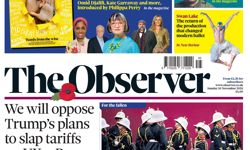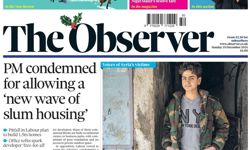Andrew Mullins, the national newspaper executive, is an accomplished marketer with a record of innovation and an intimate knowledge of classic marketing tactics such as brand building and line extensions.
It may have been a while ago, but no one could doubt his knowledge about how to sell household detergents from his days in charge of Lever Brothers’ central soap brand, Persil, in the UK.
Earlier he had spent three years on new product development in Italy and across Europe for the company.
Likewise, his reputation for finding new ways to market bourbon and gin to new younger consumers by adding sweetness and fizz is well established after years as global innovations director of United Distillers, now part of Diagio.
As he says of himself in the jargon of his trade, he is: “An innovative consumer-facing marketer by training. A business strategist and leader of change in practice.”
His background in marketing of mass consumer products is, Mullins believes, “absolutely essential” to his current challenges, the greatest of his career, running the Evening Standard, the Independent, the “i” and now London Live, the recently won local television licence for London. Of the four, London Live may turn out to be the toughest.
And all that experience could be stripped down to a single key word – convenience.
“Most of the things I have done have been about convenience driving demand. It either enables you to charge more for a product, or helps you sell more. It’s the biggest driver for production in the Western world,” claims Mullins, whose first encounter with newspapers came in a six-year stint as marketing director and general manager of News International.
The Compact Times
“When I arrived at News International, on my first day, I took a compact version of the Times to Les Hinton (then chief executive) and said, you need to go to a smaller, more convenient format because people weren’t buying the Times broadsheet and carrying on reading it on trains,” Mullins recalls.
There was no problem selling a broadsheet Times to the retired of Eastbourne and the subscription market, but there was no way, Mullins believed, that you would find it easy to increase the core business audience, where you hoped to make money, with a broadsheet.
The sheer inconvenience and the near impossibility of reading a broadsheet in a crowded commuter train would pose an unnecessary barrier to many.
Before being headhunted by the Daily Mail and General Trust to be managing director of the Evening Standard, Mullins was involved in everything from the launch of the compact Times to supplements such as The Game, Bricks and Mortar and Body and Soul and advertising campaigns such as “Join The Debate”.
The Evening Standard turned out to be a very different level of challenge with an accelerating rate of circulation loss.
“Maybe it would work better if we could do clever things because it is a small geography,” mused Mullins. But nothing seemed to work and soon annual losses were close to £20 million a year and rising.
“It was clear that DMGT was running out of ideas and were certainly frustrated. The way that DMGT managed the brand was not going to move it forward,” says Mullins, who came up with a new radical business plan.
“I didn’t realise then that the business plan became the sale document for the Lebedevs,” the executive adds.
Sale price: £1
It is difficult to remember now the surprise caused by the announcement in 2009 that Alexander Lebedev, the former KGB officer in London, and his son Evgeny, were buying the Evening Standard for £1 plus the assumption of substantial losses and obligations.
Mullins stayed with the Evening Standard under the new ownership.
The initial strategy was a hybrid with a free component because the Lebedevs wanted at least part of the circulation to be paid for. But the managing director realised before long that the strategy wasn’t working and couldn’t work. The dial had moved a bit but nothing like enough.
“It became abundantly clear that they (the Lebedevs) were owners with a lack of patience and a desire to take risks,” says Mullins who warned them that the radical approach was the only way to go.
The alternative was spending a great deal of money over three years and getting nowhere.
Mullins spent two hours at Evgeny Lebedev’s home and convinced him the Evening Standard should go free and his father was summoned from Moscow.
“Alexander said, why didn’t you just decide to take it free,” Mullins recalls.
The three-year plan envisaged break even in three years and taking into account the unexpected depths of the recession and the soaring cost of newsprint, the free Evening Standard has performed better than expected. On a daily distribution of 700,000, which could rise if the economic outlook improves, the Evening Standard made a trading profit of £1 million last year and broke even on an operating basis after exceptional charges.
“i”
The Lebedev’s bought the Independent in the hope of achieving cost synergies but “with no real strategy of how it should be evolved and, basically, get your audience growth very, very fast.”
From his experience in national newspapers, Mullins was convinced that promotions and bulks just didn’t work.
The challenge was, somehow, to get more and more papers into the hands of an audience who would still be perceived as Independent readers.
“That’s when FMCG (fast moving consumer goods) came in – with line extension, the real skill is to have one type of product and package it up in different forms,” explains Mullins.
And that is where the “i” came from.
At first glance, this particular line extension looked like a dangerous departure – potentially risking taking readers paying £1.20 a day for the Independent and giving them the heart of its content for only 20p.
Mullins insists that the numbers add up very well and that the Independent, now with a fully paid circulation of only 80,000 has lost only 8,000 sales through cannibalisation - beyond what its natural paid-for sales would have been if nothing had happened.
Foreign Independent bulks and Irish copies were switched to the “i” which means cheaper distribution – 56 pages instead of the Independent’s 100 pages.
The new paper sells 235,000 copies giving a circulation of around 300,000 when the old Indy bulks are included.
“Every time we put TV advertising behind the “i”, it jumps by 15,000 to 20,000. It has been very responsive to marketing,” says Mullins who can sell the combined total of readers to advertisers.
London Live
Now Mullins, who is already managing director of the Evening Standard, the Independent, the “i” and associated online services, has also become managing director of London Live.
“My focus now is to try and get the TV right rather than chuck a load of money at the “i”, but that is not to say the Lebedevs aren’t going to say they want to keep it growing,” says Mullins.
The company bid for a local television licence because of the perception among many advertisers that television advertising is more attractive than print even though the argument should be more about effectiveness rather than perceptions.
The deal is also partly about trying to create another stream of revenue to help support the papers in future.
“Television has done a phenomenal job recently and given itself a second life. I thought we needed a TV component. The best way to make money on the web will be through video and the great thing is to have a TV station that makes money and provides content free for your other outlets,” explains Mullins.
He is relying on advice from television professionals such as Jane Mote, former head of BBC London News and David Eades, the BBC World News presenter.
Eades will be running his eye over the potential of any Evening Standard journalists who fancy working before the cameras.
Risk of overload?
Journalists fear that the Lebedev media companies are trying to do more and more with fewer and fewer staff.
In the latest restructuring which followed the London Live licence win, up to 20 journalists are going as the entire group moves to seven-day operation. The casualties include popular Independent on Sunday editor John Mullin. Uncertainty is also created by the fact that Alexander Lebedev is facing a “hooliganism” charge in Russia, which carries a sentence of up to five years in jail, after he punched a fellow Russian billionaire on television.
The UK businesses are however owned by Evgeny Lebedev and should be insulated whatever the outcome in Russia.
Mullins has been given money to hire new staff for the television venture and the Standard will provide expertise in areas such as business, politics, travel, entertainment and property.
More material could be provided by journalism students at London’s City University. Mullins also believes that the concept of a virtual user generated network around London is totally plausible now in the way that it wasn’t three years ago.
“The question is who you pay and who you don’t pay for it,” adds Mullins who promises modern and radical ideas to break the traditional TV mould.
Many are sceptical about whether London Live – or indeed any of the local television licences can be financially viable - and if it’s not, it could become a new and potentially fatal drain on an already fragile newspaper group.
Andrew Mullins is, of course, optimistic about his latest brand extension and believes London Live will reach break even in the fourth year.
If that were to happen, Mullins the marketing man, would be able to offer advertising across television and online, as well as in the three print titles. That would not only be a great convenience for all concerned, it might also be the start of a small but perfectly formed virtuous circle.












